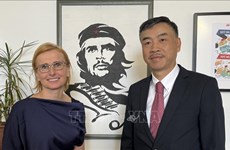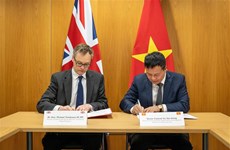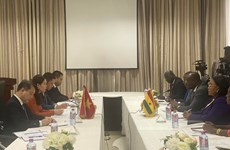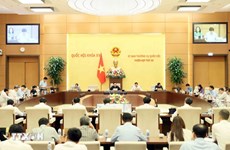Russian Prime Minister concludes official trip to Vietnam
Russian Prime Minister Dmitry Medvedev wrapped up his two-day official visit to Vietnam on November 19 at the invitation of his Vietnamese counterpart Nguyen Xuan Phuc.
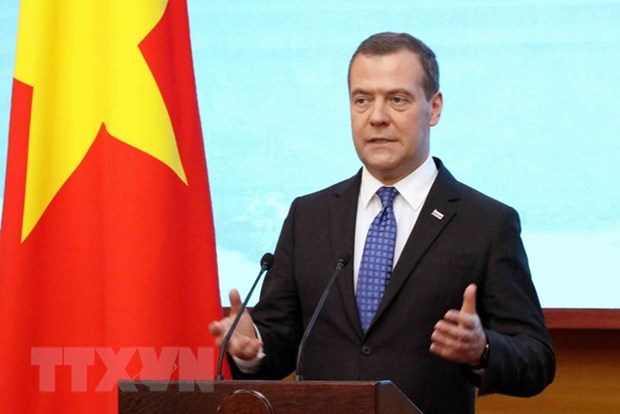 Russian Prime Minister Dmitry Medvedev (Photo: VNA)
Russian Prime Minister Dmitry Medvedev (Photo: VNA)Hanoi (VNA) – Russian Prime Minister Dmitry Medvedev wrapped up his two-day official visit to Vietnam on November 19 at the invitation of his Vietnamese counterpart Nguyen Xuan Phuc.
During the trip, the Russian PM held talks with PM Phuc; paid a courtesy call to General Secretary of the Communist Party Central Committee (CPVCC) and President Nguyen Phu Trong; and met with National Assembly Chairwoman Nguyen Thi Kim Ngan. On the occasion, he laid wreathes at the Ho Chi Minh Mausoleum and Martyrs Monument in Hanoi, and visited a photo exhibition on Vietnam-Russia traditional relations and comprehensive cooperation, which was co-organised by the Vietnam News Agency (VNA) and the Russian News Agency TASS. He also toured the Vietnam-Russia Tropical Centre and presented a gift from the Russian Government to the science and technology research establishment.
Through these meetings, in an atmosphere of friendship, mutual trust, and understanding, the Vietnamese and Russian sides discussed orientations and measures to boost cooperation across many fields towards deepening the two nations’ strategic partnership.
They agreed to celebrate the Vietnam Year in Russia and the Russia Year in Vietnam during 2019-2020 to mark the 25th anniversary of the signing of the treaty on fundamental principles of Vietnam-Russia friendly relations (2019) and the 70th founding anniversary of bilateral diplomatic ties (2020).
To optimise opportunities brought by the Free Trade Agreement between Vietnam and the Eurasian Economic Union, both sides promised to coordinate and gradually address barriers on the import and export of goods, especially agro-fishery-forestry products, with the aim to raise two-way trade to 10 billion USD by 2020.
They affirmed to continue facilitating oil and gas exploration and exploitation on Vietnam’s continental shelf and Russian territory, and encouraged the expansion of cooperation in other fields such as liquefied natural gas (LNG) and gas power supply.
Both sides agreed to step up large-scale projects in the fields of energy, industry, transport, agriculture, and expand collaboration in information, digital technology, and e-Government.
They pledged their commitment to carrying out a 350-million-USD Nuclear Science and Technology Centre, while encouraging cooperation to develop urban transport infrastructure and railways in Vietnam.
The sides reached a consensus on expanding joint engagements in security-defence, science-technology, culture, tourism, education-training, and labour; as well as on the advancement of partnerships between their localities.
They exchanged views on international and regional matters of common concern. They stressed the need to maintain peace and stability, which involves ensuring aviation and navigation security, safety, and freedom in the East Sea and solving disputes peacefully on the basis of respecting international law, including the UN Convention on the Law of the Sea 1982, fully and effectively implementing the Declaration on the Conduct of Parties in the East Sea, and working towards the early signing of a Code of Conduct in the East Sea.
The sides stated they will maintain coordination at multilateral forums, foster cooperation within the framework of the United Nations, the Asia-Pacific Economic Cooperation (APEC) forum, the Asia-Europe Meeting, and the ASEAN-Russia cooperation, for the sake of the two peoples, and for peace, stability, and development in the region and the world. –VNA









